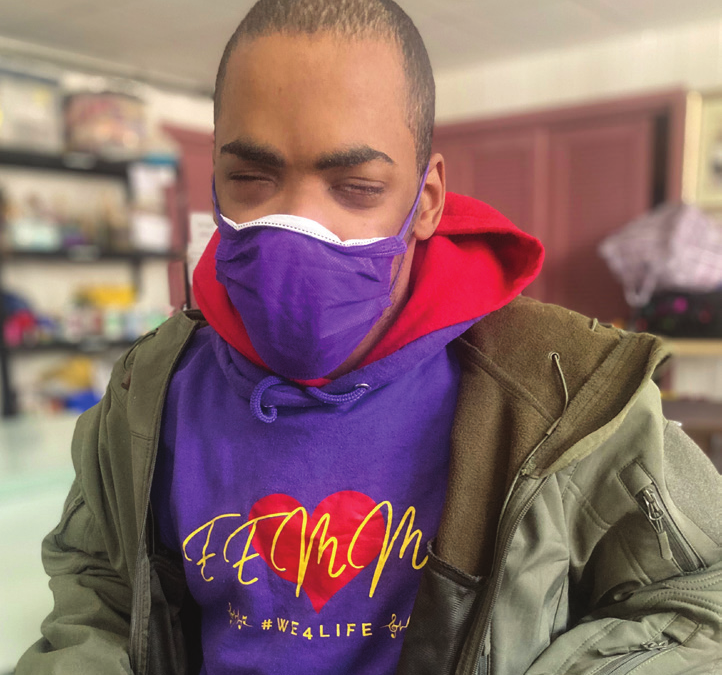
by Carly Eden Stokes | Apr 20, 2022 | Blog, News, Newsletters
Five years after attending Vision Loss Alliance of New Jersey’s technology program as a high schooler, 23-year-old Aaron Grimes now spends his Tuesdays teaching others without sight all the ways their iPhones can serve them.
“I like sharing my knowledge, and making someone’s life a little bit easier,” he said. Aaron was pre-school age when he became blind. He was born with both congenital glaucoma and aniridia, a genetic disorder that prevented his irises from fully developing, he said. Aaron doesn’t recall much about his sighted years, but has memory of colors. An infection that hospitalized him for weeks claimed all his sight except for a little light perception in his left eye. Aaron attended public primary schools in Jersey City, where he’s always lived. “When I was a kid, I didn’t feel included,” he said. While attending a high school for the blind in 2017, his rehabilitation counselor encouraged him to take classes at VLANJ.
“I learned how to use advanced apps on the iPhone,” he said. One of his favorites is Seeing AI [Artificial Intelligence], which reads documents, handwriting, and barcodes on products, and identifies denominations of money. With Be My Eyes, a sighted volunteer appears on video and provides assistance. Volunteers have helped Aaron adjust his thermostat and pick out clothing. For news, he turns to NFB-NEWSLINE from the National Federation for the Blind, which reads aloud articles from popular sources.
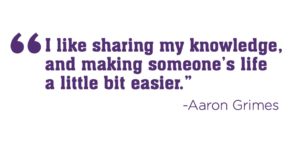
A quote in purple letters reads: “I like sharing my knowledge, and making someone’s life a little bit easier.” – Aaron Grimes
“I still use all of them,” he said. When VLANJ reopened in-person classes in September, Aaron began volunteering with the mobile technology program. He takes two Access Link buses to get to Denville, often spending two or more hours traveling each way.
On a recent Tuesday, Aaron was showing Susan, a student with glaucoma, how to use the VoiceOver app that reads what is on her screen. “Aaron is great! He really helps me,” she said.
Aaron is typically paired with an instructor in the morning, and then works one-on-one with a student in the afternoon. He is eager to teach advanced apps, but understands students need to know the basics first. Aaron also makes sure students’ iPhones have the latest updates. “They call me `Zippy’ because I’m fast,” he said with a laugh.
Aaron hopes more younger adults discover VLANJ, but for now, he enjoys helping the older participants. Volunteering with VLANJ has given him purpose. “I’m happy with what I’m doing,” said Aaron, who lives with an older brother and sister-in law. (His mother died 10 years ago.) “I like spending time here. It’s nice making friends.”
Donations to Vision Loss Alliance can be made online at vlanj.org/donations or by mailing a check to Vision Loss Alliance of New Jersey, 155 Morris Ave., Suite 2, Denville, NJ, 07834, ATTN: VP of Development and Communications Jennifer Singer
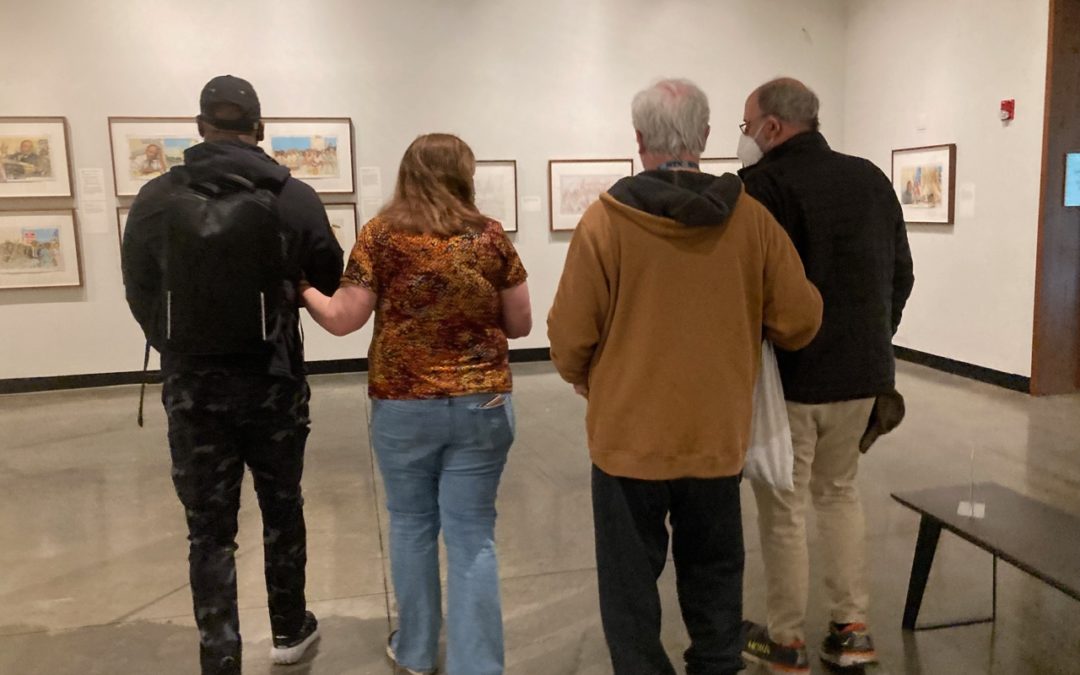
by Carly Eden Stokes | Mar 30, 2022 | Blog, Events, News, Press Releases
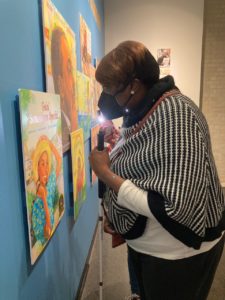
Valerie Frink of Jersey City, a VLANJ participant, closely inspects a bright, colorful work by artist Jerry Pinkney, using the flashlight on her mobile phone.
MONTCLAIR, NJ (March 30, 2022) — As part of its effort to expand access for people with special needs, the Montclair Art Museum last week gave Vision Loss Alliance of New Jersey participants a guided exhibit tour that featured detailed audio descriptions of artwork and multi-sensory objects to help visualize pieces.
“I liked being able to feel the object related to the artwork, and hear about the artist and materials used,” said VLANJ participant Debbie Tester, who has lost most of her sight to a degenerative eye disease. “It helped me get a picture in my head.”
The MAM tour was VLANJ’s second orientation and mobility community outing to learn and practice getting around in public spaces. The outings are generously funded by grants from the William G. and Helen C. Hoffman Foundation and the Lydia Collins deForest Charitable Trust. Two VLANJ orientation and mobility experts accompanied the group and provided training inside the museum and on its grounds.
VLANJ participants gave MAM’s program high marks. “Make it longer!” suggested Roman Dodia. Montclair State University Associate Professor Maria José Garcia Vizcaíno, who volunteers as a docent, narrated the exhibit, “Transformed: Objects Reimagined by American Artists.”
![VLANJ participants view a black panther sculpture during a Montclair Art Museum tour on March 25. [MAM photo credit]](https://www.vlanj.org/wp-content/uploads/2022/03/IMG_4727-225x300.jpeg)
VLANJ participants view a black panther sculpture during a Montclair Art Museum tour on March 25. [MAM photo credit]
MAM is committed to expanding access for people with special needs. It recently created the position of assistant director of Community and Access Programs, held by Celene Ryan. The museum offers virtual programs and runs in-person art classes that provide more support, with one-on-one or small-group instruction, Ryan said. New Jersey residents who receive Division of Developmental Disabilities funding can use the money to take MAM classes, she noted.
The VLANJ participants asked astute questions as they moved through the gallery, Ryan said. “They were really engaged.” They then provided feedback on the tour and MAM’s accessibility efforts in a focus group run by Montclair State University Associate Professor Elaine Gerber.
The nine VLANJ participants offered a range of useful suggestions, such as having the museum’s floor plan mapped on a GPS system like GoodMaps to help visually impaired people get around. They suggested information about artwork on plaques have a companion audio description, and that tape on the floor marking how close visitors can get to artwork be textured so people using canes can identify it.
VLANJ Vice President of Programs Elsa Zavoda demonstrated mobile phone apps that allow people with vision impairment to listen to written information about artwork. Because of the museum’s high ceilings, Zavoda recommended MAM tour guides use lapel amplifiers so visitors don’t miss narrations.
Museum Director Ira Wagner noted MAM tries to incorporate social elements into programming, inviting artists to speak. To thank VLANJ participants for their input on improving access, Wagner offered the group one-year memberships to MAM.
For more information about MAM, visit montclairartmusuem.org.
Visit vlanj.org to learn about VLANJ programs.
————-
About Vision Loss Alliance of New Jersey
Vision Loss Alliance of New Jersey is a 501(c)(3) that provides practical training and emotional support to help those who have experienced profound vision loss regain self-esteem and self-reliance. Since its founding in 1943, Vision Loss Alliance of New Jersey has used a holistic approach to empower those with profound vision loss to live engaged, productive and independent lives. Go to vlanj.org for more information.
About the Montclair Art Museum
The Montclair Art Museum (MAM) boasts a renowned collection of American and Native American art that uniquely highlights art-making in the United States over the last 300 years. The Vance Wall Art Education Center encompasses the Museum’s educational efforts, including award-winning Yard School of Art studio classes, lectures and talks, family events, tours, and the mobile MAM Art Truck. MAM exhibitions and programs serve a wide public of all ages and abilities, from families and seniors to artists, educators, and scholars.
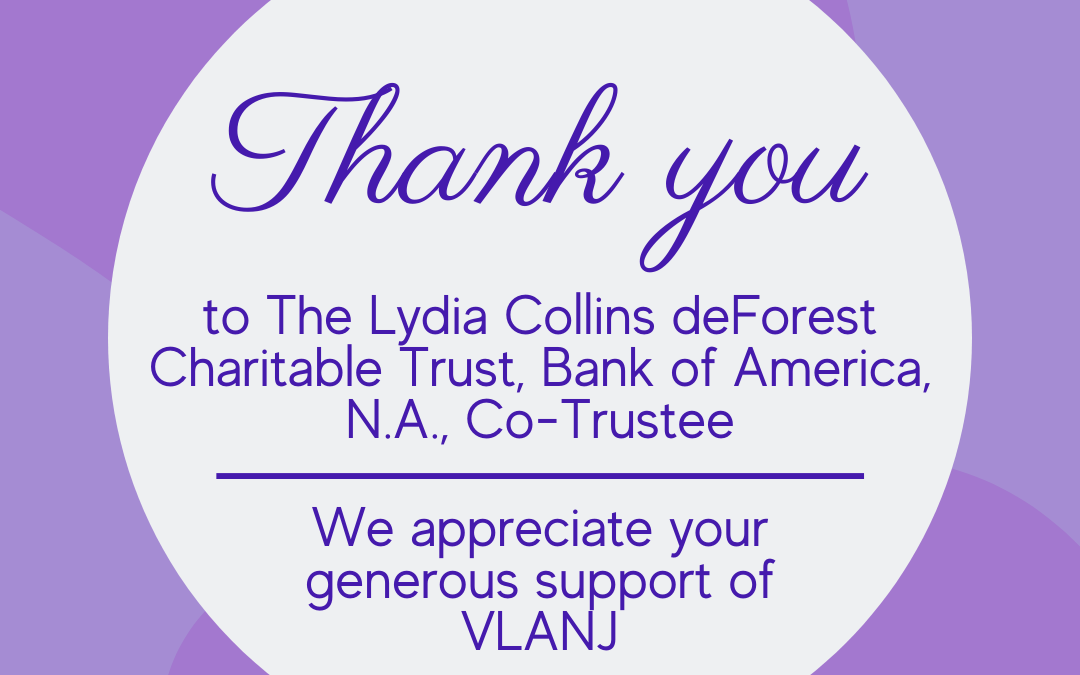
by Carly Eden Stokes | Mar 21, 2022 | Blog, News
The Lydia Collins deForest Charitable Trust, Bank of America, N.A., Co-Trustee has awarded a grant of $37,000 to Vision Loss Alliance of NJ to design and implement a hybrid model of program service delivery: in-person classes and virtual sessions via Zoom.
The approach addresses the most significant needs impacting VLANJ clients before, during, and continuing into the post-COVID-19 climate. Program participants and the community will benefit through expanded access to information and training; flexible, cost-effective services; greater diversity and geographic reach; a wider range of service options; and individualized supports and services.
Thank you to the Lydia Collins de Forest Charitable Trust, Bank of America, N.A., Co-Trustee for making these opportunities a reality for our program participants!
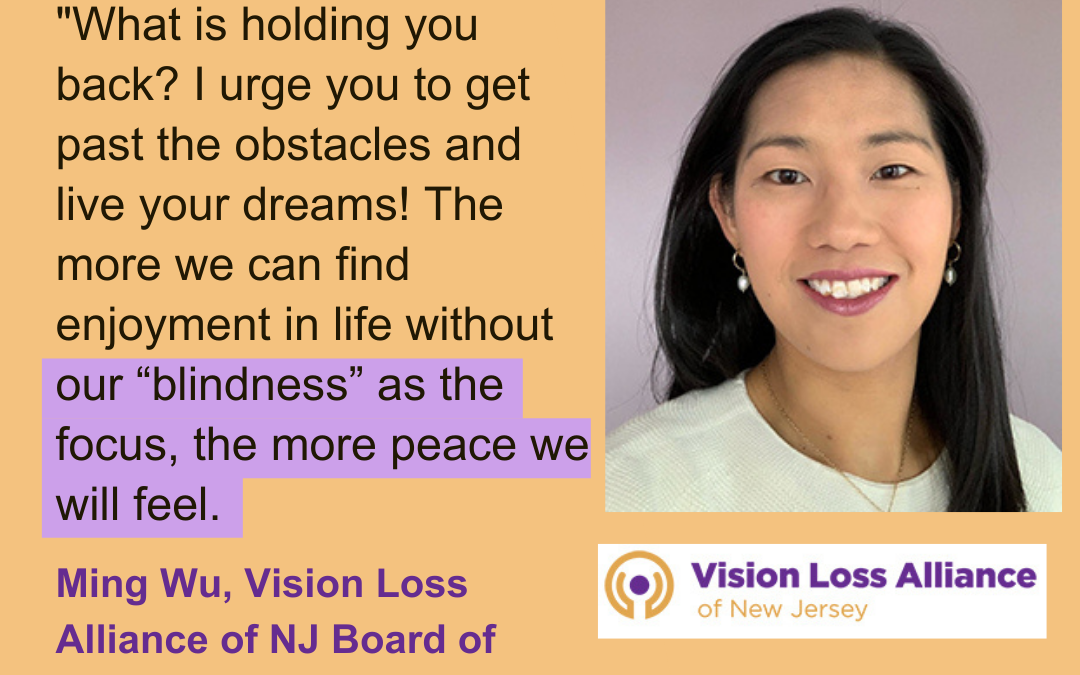
by Carly Eden Stokes | Dec 21, 2021 | Blog, News
A letter from VLANJ’s CEO, William Schuldt:
What can change the ordinary to the extraordinary? What can help a person with vision loss find happiness and fulfill their dreams? With your help, Vision Loss Alliance of NJ has been doing just that for 78 years.
Ming, a wife, a mother, a writer, and a Vision Loss Alliance of NJ trustee, was born with a genetic disorder that would affect her sight and will eventually lead to total blindness. Today, she is legally blind and can only see light and shadows. While she describes her life as ordinary — I want to share with you how someone with vision loss accomplishes the extraordinary, while living that ordinary life.
You have most likely experienced a day when the demands are varied and often exhausting — with vision. Ming describes her typical morning much as yours: waking early, choosing clothes, dressing, making breakfast for the family, and getting the children ready for school. After checking that each child has her homework, snacks, water bottles, and anything else needed for the day, you take them to school. Imagine for a moment how you would get through your morning without full use of your vision, as Ming does. She will frankly say, “Parents who are blind face the same challenges as other parents, but must find different ways to address those challenges.”
As a trustee who has lived with sight loss and learned different ways of doing things, Ming highlights VLANJ’s unique approach:
• VLANJ core programs are a combination of skills-based classes and sessions that focus on mental well-being. These comprehensive services provide emotional support while covering all the basic skills that people with vision loss need to relearn. It is important to have the fundamental skills in place before moving forward, which leads to the next point.
• What sets VLANJ apart from other providers is that services do not stop at basic skills. Our range of programs, while building on basics, helps clients apply those skills to their unique lives. This is critical, because as people lose their vision, they not only want to do the basic things in life but, like everyone, they want to keep learning and enriching their lives. Ming believes that you can cultivate well-being and happiness despite losing your vision when you have the skills and supports to make that choice. For Ming, her happiness meant regaining her lost passion — ballet. She wanted to feel that joy again. After what she calls “endless procrastination,” she faced her fear of not being able to dance with her limited sight. As Ming stood in the entrance to her building clutching her cane and sending her usual message to the Uber driver to look out for her, she was full of questions. “Will I find the studio?” “Will I be able to keep up with the class?” “Will they mind that I cannot see?”
She considered each challenge. “I couldn’t see to walk or drive to the class so I ordered the Uber and told the driver I couldn’t see. He helped me. I couldn’t find the studio, so I rang the doorbell and was guided by a friendly person who occupied the first floor of the building. He helped me find the studio. I couldn’t see the teacher demonstrating, so I listened very carefully to his instructions. I was dancing!”
It was far from perfect, but for each obstacle there was a workaround. Ming explains, “I know we’d rather not need workarounds; I’d much prefer to just go to ballet class like everyone else. But it was worth the struggle, as my reward was the enjoyment of dancing and a confirmation that I could do this, even if it was hard.”
Now that Ming is dancing again, her challenge to you is this: “What is your ballet? What would fulfill your dreams and spark your passion? What is your blindness? What is holding you back? I urge you to get past the obstacles and live your dreams! The more we can find enjoyment in life without our “blindness” as the focus, the more peace we will feel. This is a journey we all can take, but it is sweeter if we have company along the way.”
Please make a gift today that will not only help those with vision loss find their passion, but may also help you to up your happiness game! You can support VLANJ here: https://www.vlanj.org/donations/
Yours sincerely,
William Schuldt, CEO
P.S. Your gift means that when a person loses their vision, they can access the support they need to keep living their lives. Please give your proudest gift today.
by Carly Eden Stokes | Oct 6, 2021 | Blog, News
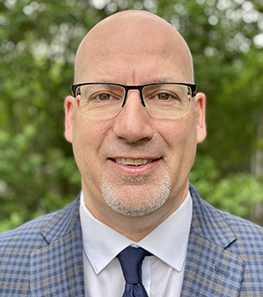
Bill Schuldt smiles into the camera with green foliage behind him.
Dear Friend,
I am excited to be welcoming participants back to our Denville and Ridgewood locations this month, and I’m looking forward to meeting more of the VLANJ community. (It was a pleasure meeting more than two dozen people over Zoom back in May.) While our virtual programming kept staff and students connected during the pandemic, there’s nothing like gathering in person, to learn with and support one another.
In my first months as president and CEO, I find myself impressed by the drive and commitment of our staff, students, and trustees. We are busy developing plans for robust offerings going forward, a combination of in-person and online classes. This will be a work in progress, as we learn what works and strike a balance for using our current resources.
We resumed in-person Better Health and Wellness classes this month, with COVID-19 protocols in place. Rather than have all students attend on a single day, we will host two weekly sessions, with roughly half of participants attending each. Everyone will be required to wear masks. As always, our goal is to keep us all healthy.
Virtual classes have been invaluable during the pandemic, and we were proud to roll out new programs for healthy aging. We have Atlantic Health System’s Morristown Medical Center Community Health Committee to thank for the grant that funds LIFT, STRIVE, and the newest addition, ARISE, a virtual speaker series which will feature a variety of topics designed to motivate and inspire people with vision loss to achieve their best selves.
I want to acknowledge a generous — and unexpected — bequest we recently received from the estate of a VLANJ supporter. We are honored to be remembered in her will. VLANJ is so grateful to donors who contribute monthly and annually but hope more supporters will also include us in their estate planning. Over VLANJ’s 78-year history, bequests have played an important role in our funding. We are establishing a legacy society so supporters can inform us of their intended gift, allowing us to plan accordingly.
Know that VLANJ’s work of empowering people with vision loss in all aspects of life could not happen without our supporters. I look forward to getting to know more of you in the coming months. Please feel free to reach out to me by phone or email with your ideas and questions. Wishing you well.
Sincerely,
Bill Schuldt
VLANJ President and CEO
wschuldt@vlanj.org
(973) 627-0055 ext. 1333





![VLANJ participants view a black panther sculpture during a Montclair Art Museum tour on March 25. [MAM photo credit]](https://www.vlanj.org/wp-content/uploads/2022/03/IMG_4727-225x300.jpeg)


